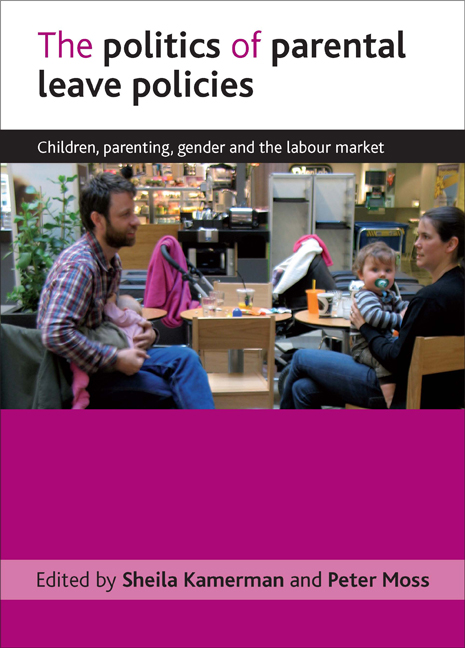Book contents
- Frontmatter
- Contents
- List of tables and figures
- Acknowledgements
- Notes on contributors
- one Introduction
- two Australia: the difficult birth of paid maternity leave
- three Canada and Québec: two policies, one country
- four Czech Republic: normative or choice-oriented system?
- five Estonia: halfway from the Soviet Union to the Nordic countries
- six Finland: negotiating tripartite compromises
- seven France: gender equality a pipe dream?
- eight Germany: taking a Nordic turn?
- nine Hungary and Slovenia: long leave or short?
- ten Iceland: from reluctance to fast-track engineering
- eleven The Netherlands: bridging labour and care
- twelve Norway: the making of the father’s quota
- thirteen Portugal and Spain: two pathways in Southern Europe
- fourteen Sweden: individualisation or free choice in parental leave?
- fifteen The European directive: making supra-national parental leave policy
- sixteen Conclusion
- Appendix
- Index
eight - Germany: taking a Nordic turn?
Published online by Cambridge University Press: 05 July 2022
- Frontmatter
- Contents
- List of tables and figures
- Acknowledgements
- Notes on contributors
- one Introduction
- two Australia: the difficult birth of paid maternity leave
- three Canada and Québec: two policies, one country
- four Czech Republic: normative or choice-oriented system?
- five Estonia: halfway from the Soviet Union to the Nordic countries
- six Finland: negotiating tripartite compromises
- seven France: gender equality a pipe dream?
- eight Germany: taking a Nordic turn?
- nine Hungary and Slovenia: long leave or short?
- ten Iceland: from reluctance to fast-track engineering
- eleven The Netherlands: bridging labour and care
- twelve Norway: the making of the father’s quota
- thirteen Portugal and Spain: two pathways in Southern Europe
- fourteen Sweden: individualisation or free choice in parental leave?
- fifteen The European directive: making supra-national parental leave policy
- sixteen Conclusion
- Appendix
- Index
Summary
Maternity leave: 14 weeks at 100% of earnings with no ceiling; 8 weeks obligatory.
Paternity leave: none.
Parental leave: until 3 years after childbirth; family entitlement. Twelve months paid at 67% of average earnings during the 12 months preceding childbirth; if the father takes at least 2 months of leave, the overall length of benefit payment is extended to 14 months. No means test applies, but there is a ceiling of €1,800 per month. Instead of 12 (+ 2) months, the childrearing benefit may be spread over 24 (+ 4) months, but the monthly benefit level is reduced so that the overall payment remains the same. Parents receiving a childrearing benefit may work up to 30 hours a week. However, if the company they work for has less than 15 employees, they need their employer's consent.
Leave to care for sick children: up to 10 days per illness, for parents of children under 12 years at 80% of earnings with no ceiling. The maximum annual leave period that may be taken per family is 25 days.
Other: up to 6 months of unpaid leave for relatives of care-dependent persons.
Germany is a member state of the European Union (EU). It is a federal state, formed from the unification of the former Federal Republic of Germany (West Germany) and the former German Democratic Republic (East Germany) in 1990; some states (Länder) pay additional benefit to parents taking leave. The former leave entitlement was widely used by mothers. The new entitlement, introduced in 2007, has led to a substantial increase in fathers taking leave, up from 3.3% in 2006 to 15.4% in the first half of 2008.
Introduction
As in many European countries, German parental leave legislation has been undergoing considerable changes in recent years, culminating in the introduction of a 12-month wage replacement benefit in 2007. When parental leave was introduced in West Germany in 1986, the primary aim of policy makers was to enable and actively encourage mothers to stay at home and care for their children during the first years of their life. The new income-related childrearing benefit (Elterngeld), by contrast, has the explicit purpose of reducing the length of child-related periods out of the labour market and of facilitating a stronger paternal involvement in childrearing.
- Type
- Chapter
- Information
- The Politics of Parental Leave PoliciesChildren, Parenting, Gender and the Labour Market, pp. 119 - 134Publisher: Bristol University PressPrint publication year: 2009
- 2
- Cited by



